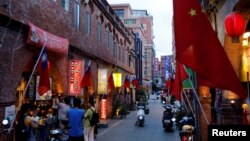Experts say China is trying different ways to influence Taiwan, the self-ruled island it hopes to bring under its flag.
At the same time, China has increased military pressure on Taiwan.
Scholars in Taipei say the Communist government in mainland China announced a list of incentives aimed at getting the attention of the Taiwanese people. They include ways to get Taiwanese to invest, work and study in mainland China.
The scholars warn that incomes in Taiwan are too low for people to afford housing in some cities. They say some of Taiwan’s young people may turn to China in search of higher pay and a more international economy.
China’s official Xinhua News Agency reported recently that five cities in Fujian province announced a so-called “talent exchange.” The program aims to increase opportunities for Taiwanese youth to come to Fujian to start businesses.
Fujian is the Chinese mainland province nearest Taiwan.
Huang Kwei-bo is vice dean of the international affairs college at National Chengchi University in Taipei. He said more Taiwanese will be attracted to going to the mainland because of, in his words, “the very large size of mainland China’s economy and because its economy is actually still growing, plus its internationalization is better than Taiwan’s.”
Chao Chien-min is dean of social sciences at Chinese Cultural University in Taipei. He said government agencies may offer other incentives, too.
Last year, the Chinese government announced 31 incentives to get people to work, study and invest. The proposals included reduced taxes and special land-use rights.
Chao expects younger Taiwanese to go for these incentives if economic problems at home continue. He said, “Finding work, especially for Ph.D. students, it’s gotten extremely difficult.”
China’s economy most recently grew by 6.6 percent compared to Taiwan’s 2.8 percent.
Huang said investments by international companies in China have fueled its growth. He said Taiwanese employees can get more “exposure” to them in China than at home.
However, there are a lot of risks. China and the United States are currently involved in a trade dispute. Copyrights and trademark property rights protections remain an important issue. The differences between the countries could affect China’s manufacturing and legal system, and its future economic growth.
China considers self-ruled Taiwan a rebel province and has threatened to use force to take it back. The sides were separated at the end of China’s civil war in 1949. The Chinese Communist Party took over the mainland and the Nationalist government ruled Taiwan.
In January of this year, Taiwan’s Mainland Affairs Council carried out a study that found more than 80 percent of Taiwanese oppose rejoining China. The council considers China’s incentives as a “soft” method to bring the sides together without force.
Soft power and hard power
Taiwanese President Tsai Ing-wen strongly opposes rejoining China. To pressure Taiwan’s government, China has flown airplanes and sailed ships close to the island. It has also held back tourist visits to the island, which is popular with mainlanders. These methods are what experts describe as “hard power.”
Joanna Lei is chief of the Chunghua 21st Century Think Tank in Taiwan, a research group. Lei said China’s official incentives will run out, and it is unclear if more will be offered.
Chao said China still has more “soft power” possibilities available. But it is unclear if the mainland will choose to use them. He added that universities in China continue to rise in the international rankings and are adding students. In that way, Chao said, China has “already raised its soft power by a lot.”
“Taiwan needs to speed up a bit,” said Liang Kuo-yuan, president of the Taipei research organization Polaris Research Institute.
Liang added, “National Taiwan University used to be well ahead of Peking University, and National Tsing Hua University in Hsinchu (Taiwan) was also well ahead of the Tsinghua University in Beijing”
Today, Peking University ranks number 68 and Tsinghua University in Beijing number 50 on the U.S. News & World Report rankings. National Taiwan University ranks 174th.
I’m Mario Ritter, Junior.
Ralph Jennings reported this story for VOA News. Mario Ritter Jr. adapted it for VOA Learning English. Ashley Thompson was the editor.
_______________________________________________
Words in This Story
incentive –n. something meant to get people to behave in a certain way
talent –n. a group of people with a special ability
Ph.D. –n. the highest degree given at a college or university
scholar –n. a person who has studied a subject for a long time and is very knowledgeable in it
dean –n. a person who is in charge of a part of a university
We want to hear from you. Write to us in the Comments section, and visit our Facebook page.





